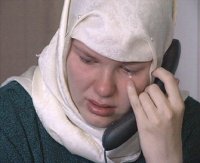
INSHA ALLAH - JOS JUMALA SUO
 Visa Koiso-Kanttilan dokumenttielokuva Jos Jumala Suo kertoo siitä, millaista on elää pakolaisena vuosituhannen vaihteen Suomessa. Elokuvassa seurataan kahden nuoren somaliperheen värikästä elämää Helsingissä vajaan vuoden ajan. Elokuvan päähenkilöitä ovat somalilainen Rashka ja hänen suomalainen vaimonsa Heidi, sekä somalilaiset Farhaan ja Fuad.
Visa Koiso-Kanttilan dokumenttielokuva Jos Jumala Suo kertoo siitä, millaista on elää pakolaisena vuosituhannen vaihteen Suomessa. Elokuvassa seurataan kahden nuoren somaliperheen värikästä elämää Helsingissä vajaan vuoden ajan. Elokuvan päähenkilöitä ovat somalilainen Rashka ja hänen suomalainen vaimonsa Heidi, sekä somalilaiset Farhaan ja Fuad.Rashka haaveilee matkasta äitinsä luokse Mogadishuun. Hän ei ole nähnyt äitiään yhdeksään vuoteen ja on huolissaan tämän turvallisuudesta - ikävä on kasvanut jo sietämättömäksi. Rashka on päättänyt lähteä äitinsä luokse jouluna, mutta matkalle lähteminen ei ole aivan yksinkertaista, kun on kyse sotaa käyvästä maasta.
Elokuvan toinen päähenkilö, Farhaan, haaveilee rauhasta ja paluusta Somaliaan. Hänelläkin on täällä perhe, työ ja vielä oma äiti, mutta silti elämä ei tunnu tyydyttävältä. Suomi tuntuu vieraalta ja sen kylmä ilmasto ankaralta.
Elokuvan päähenkiöiden kautta kuvataan suomalaista yhteiskuntaa ja meidän suhtautumistamme vieraisiin, eri kulttuuria edustaviin ihmisiin. Mukana kuvissa on ihmisiä, jotka haluvavat tulla toimeen uusien tulokkaiden kanssa, mutta toisaalta maamme esittäytyy myös kylmänä ja vihamielisenä periferiana, jossa ei suvaita erilaisuutta.
/Kärsin lumesta. Olen lopussa./Tarvitsen ihmisiä, joiden luokse voisin mennä./Kaipaan kyliämme./Tarvitsen maan, jonka voin tuntea omakseni./ (Maryam Mursal)
- Ohjaaja: Visa Koiso-Kanttila - Iiris Härmä
- Tuotanto: Kristiina Pervilä / Millennium, Arja Oras / Dokumenttiprojekti
In English In English In English
INSHA ALLAH - GOD WILLING
 Insha Allah describes what it is to live as a refugee in Finland at the turn of the millenium. The film follows the colourful life of two young Somali families for almost a year. The documentary brings out the conflicts between the Somalis and and their neighbours and the Finnish authorities.
Insha Allah describes what it is to live as a refugee in Finland at the turn of the millenium. The film follows the colourful life of two young Somali families for almost a year. The documentary brings out the conflicts between the Somalis and and their neighbours and the Finnish authorities.
Three of two main characters in the film: Rashka and Farhaan. Rashka has decided to leave for Mogadishu to meet his mother. Rashka has not seen his mother for nine years and is anxious for her safety.
Farhaan dreams about peace and home-coming. The Finnish neighbours of Farhaan plan to turn her family out of the house. At the end of the film there is a trial in which the future of Farhaan and his family is determined.
Through the main characters, the film describes the Finnish society and its attitude towards people who represent a culture that is strange and different to ours. Some of the Finns in the film want to get along with the newcomers while on the other hand, Finland is to be seen as a cold and intolerant periphery. In 1998, seven people in Finland were granted asylum, and four hundred people got a residence permit.
- Directors: Visa Koiso-Kanttila and Iiris Härmä
- Production: Kristiina Pervilä / Millennium, Arja Oras / Documentaries/TV2

Päivitys: 9.9.1999 U.E.